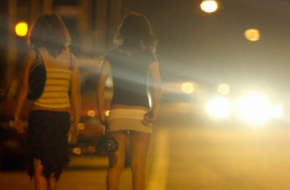
AB67 was introduced in Dec. 2012 to combat the rise of human and sex trafficking in Nevada. / Photo by AP
by PAUL GEORGE & LINDSAY TOSTE
As the only state that has officially legalized the business of brothels, it would be reasonable to assume Nevada would have a lower rate of illegal prostitution on its streets. However, the fact is that Nevada is one of the leading states to house the largest industry of sex trafficking – especially in minors. In 2012, the Senate Judiciary Committee, along with sponsor Attorney General Catherine Cortez Masto, introduced AB67– better known as the Human Trafficking Bill – to combat the rise of human and sex trafficking in Nevada.
Masto brought in AB67 after speaking to law enforcement and judges throughout Nevada who told her that human trafficking was on the rise, especially with children.
“Our own kids are being forced into this horrible trade,” Masto said in a phone interview.
According to a 2011 Federal Bureau of Investigation report, nearly three hundred thousand youths in America are at risk of becoming victims of commercial sexual exploitation. The Polaris Project, an organization dedicated to giving victims of sex and human trafficking a voice, estimates that in Las Vegas alone, 400 minors have been identified as victims of human trafficking in 2007. As recent as January of this year, a federal grand jury indicted Vernon McCullum III for transporting a 15-year-old girl from California to Reno for the purpose of prostitution.
The road to life as a sex worker may involve the coercion and manipulation of an adult who promises to provide these young men and women protection, money, shelter, etc. In most cases, according to Abigail Polus who works specifically with sex workers as Prevention Coordinator for community health center Northern Nevada HOPES, there is a strong correlation between those entering the sex industry and homelessness in the young population. Nevada is ranked 45th in the nation when it comes to child homelessness with more than 10,000 youths under the age of 17 who are homeless and alone.
“It’s what commonly occurs with any underage individual who might be homeless or on the streets or lacking in support from their parents; experiencing abuse, neglect, and substance abuse,” Polus said. “If that is your family situation and that is where your life is, yeah, you’re highly likely to try and survive any way you can.”
“The average age at which girls first become victims of prostitution is 12 to 14,” an FBI report states. “It is not only the girls on the streets who are affected; boys and transgender youth enter into prostitution between the ages of 11 and 13 on average.”
“I think taking advantage of somebody who is not at full capacity to make those decisions is not okay,” Polus said.
AB67 would give Nevada’s law enforcement a new set of tools to combat the trafficking of minors and adults; it would create the crime of sex trafficking, and it would allow adults or children forced into prostitution the right to seek damages from the trafficker. However, Polus along with other Nevada sex trafficker advocates believe laws like AB67 will have a chilling effect, the opposite of its intent, on people involved in sex work, mainly because “sex work” is a broad term that includes not only prostitution, but also other acts that involve no physical contact with the customer such as peep shows and phone sex.
Additionally, Polus says the bill runs into difficultly when it comes to defining coercion versus choice. Because while some get involved in the sex trade because they believe it is their best option, others do it because they believe they own a debt to the trafficker.
“A lot of people do see this as their best choice,” Polus said. “What realistic choices are there for helping them get out now when it’s their own decision and them using their own autonomy and being respected for the decisions that they want to help themselves in the way they see is best for them? Sex workers don’t always need to be saved. Some people have a very real choice in choosing to do that.”
There is no denying that sex trafficking does incorporate the victimization and manipulation of sex workers with brutality and threats. “That is being coerced against their will,” Polus said. “And where you are doing something unwillingly or repeatedly or because you feel helpless, or don’t have access to other services or you feel threatened with physical violence or retaliation.
In these cases, in a state that strictly criminalizes the act of illegal prostitution, those who are victims would refuse to report it because of both legal and personal repercussions. In the AB67 draft, the victim of such a crime would have no way to protect his or her true identity from the pimp as they, along with their attorneys, are entitled to that information.
Polus, who was once a sex worker herself, explained her experience in this type of situation.
“If I have something on the streets happen to me, am I going to report it? No,” Polus said. “I’m going to be afraid of getting a prostitution charge, which might outweigh the abuse that might be inflicted on me in my personal life. The harsh penalties have really the effect of not giving sex workers and sex traffickers a voice. They need to feel safe and comfortable and punishing the pimps is not saying, ‘you’re safe, you’re okay.’ It’s saying, ‘you’re good, you’re bad and you need to be saved.’”
